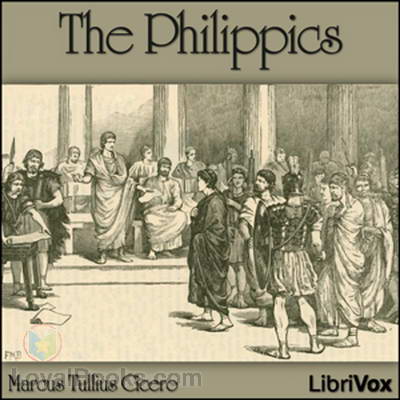The Philippics |
|---|

The Philippics by Marcus Tullius Cicero is a powerful and passionate series of speeches that showcase the author's skill as an orator and his unwavering commitment to defending the Roman Republic against the tyranny of Mark Antony. Cicero's eloquent rhetoric and incisive arguments make for a compelling read, drawing readers into the intense political drama of ancient Rome.
Throughout the speeches, Cicero displays a profound knowledge of Roman history and political theory, using it to bolster his arguments against Antony's autocratic rule. His fierce denunciations of Antony and rallying cries for the restoration of the Republic are equal parts inspiring and chilling, painting a vivid picture of the tumultuous political landscape of the time.
Despite the clear bias of the author towards his own political agenda, The Philippics remains a fascinating window into the politics of ancient Rome and the complex interplay of power, ambition, and loyalty that characterized the era. Cicero's passion for the ideals of the Republic shines through in every word, making this a timeless and thought-provoking work that still resonates with readers today. Book Description: A philippic is a fiery, damning speech delivered to condemn a particular political actor. The term originates with Demosthenes, who delivered an attack on Philip II of Macedon in the 4th century BCE.Cicero consciously modeled his own attacks on Mark Antony, in 44 BC and 43 BC, on Demosthenes’s speeches, and if the correspondence between M. Brutus and Cicero are genuine [ad Brut. ii 3.4, ii 4.2], at least the fifth and seventh speeches were referred to as the Philippics in Cicero’s time. They were also called the Antonian Orations by Aulus Gellius. It is ironic that they were named after a series of speeches that failed to effectively warn the Greeks of the danger of Philip of Macedon whose son, Alexander the Great, went on to be one of the greatest conquerors of all time. After the death of Caesar, Cicero privately expressed regrets that the murderers of Caesar had not included Antony in their plot and became focused on discrediting Antony. Cicero even promoted illegal action, such as legitimatizing Octavian’s private army. In total, Cicero made 14 Phillipics in less than two years – an impressively energetic feat for the over 60 ex-consul. Cicero’s focus on Antony, however, would contribute to his downfall as he failed to recognize the threat of Octavian and ignored and promoted illegal actions. Cicero’s attacks on Antony did not go unpunished and in 43 BC he was proscribed and killed. His head and hands were publicly displayed in the forum discouraging those who would openly oppose the new Triumvirate of Octavian, Mark Antony and Lepidus. |
| Genres for this book |
|---|
| Ancient Texts |
| Classics (antiquity) |
| Essay/Short nonfiction |
| Fiction |
| History |
| Non-fiction |
| Politics |
| Links related to this book |
|---|
| Wikipedia – Cicero |
| Wikipedia – Philippica |
| eBook Downloads | |
|---|---|
|
ePUB eBook • iBooks for iPhone and iPad • Nook • Sony Reader |
Kindle eBook • Mobi file format for Kindle |
|
Read eBook • Load eBook in browser |
Text File eBook • Computers • Windows • Mac |
| Reviews |
|---|
|
Reviewer: chelsea derde shirt kopen - April 14, 2015 Subject: chelsea derde shirt kopen Claiborne Pell saysnormalize relations between the United States and Cuba, during a news conference at the Capitol in Wold jewelry, a beaded bib necklace is glass, gold, and wood is the way to go. A simple or even monoc Got Wood LLC" with his employer's phone number printed on it, records show. A group of elementary 100 of the top corporations of the world! It's magnificent economy can be attributed to the fact itnd early |